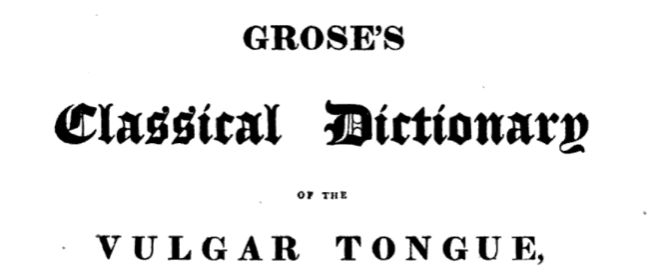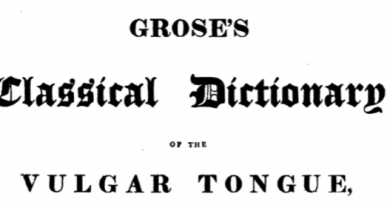Dictionary of the Vulgar Tongue – Day 290, 291 and 292
The Dictionary of the Vulgar Tongue was first published at the end of the eighteenth century, and given that the current health crisis is giving too much time to read books, I thought I’d pick a daily word from it until I got bored…. And to catch up after getting behind with these posts, and because I’m getting towards the end of the book, I’m doing three days at once now. How lovely….
Rigmarole
This is defined by Grose as “roundabout, nonsensical. He told a long rigmarole story”, and it was a phrase that would have been new at the time as its earliest recorded usage is from the middle of the eighteenth century. Oxford Languages Dictionary gives an explanation of the origins of the word, which is “apparently an alteration of ragman roll, originally denoting a legal document recording a list of offences.”
Google Ngram helpfully charts the popularity of the word over the last couple of centuries, it’s perhaps a strange word that has persisted in usage as it’s not necessarily easy to spell. In around 1880, the alternative spelling of rigamarole comes into usage, which remains relatively common today.
Roast and Boiled
Back to the military with this definition, which Grose gives as “a nick name for the Life Guards, who are mostly substantial house-keepers; and eat daily of roast and boiled”. The Life Guards are a regiment in the British Army and their heritage goes back to the middle of the seventeenth century. This web-site has details of other nicknames that the regiment managed to acquire, which included The Bangers, Lumpers, The Cheesemongers, The Fly-slicers, The Piccadilly Butchers, The Ticky Tins, The Tin Bellies and The Patent Safeties. That’s quite an impressive list of nicknames that they’ve secured for themselves….
Romeville
A short and concise definition here, simply given as “London, cant”, with cant meaning the criminal community. This sounds all rather exotic, but there’s an alternative version from the eighteenth century which is “Rumville”, although ‘Rum’ here means good. Although there are different spellings, the meaning was the same, which was the canting community felt that London was a city of great opportunity to them. The word fell out of usage in around the 1850s, although New York then took on the same nickname. I think I quite like the idea of London being referred to as ‘Rumville’ though…..



